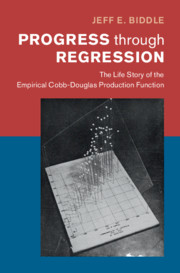Book contents
- Progress through Regression
- Historical Perspectives On Modern Economics
- Progress through Regression
- Copyright page
- Dedication
- Contents
- Figures
- Acknowledgments
- Introduction
- Part I Paul Douglas and His Regression, 1927–1948
- 1 The Origins of Douglas’s Production Function Research Program and His Initial Time Series Studies
- 2 The Douglas–Mendershausen Debate and the Cross-Section Studies
- 3 Theoretical and Econometric Challenges of the Early 1940s, and Douglas’s Final Word
- Part II The Diffusion of the Cobb–Douglas Regression
- Part III Conclusion
- References
- Index
- Historical Perspectives On Modern Economics
2 - The Douglas–Mendershausen Debate and the Cross-Section Studies
from Part I - Paul Douglas and His Regression, 1927–1948
Published online by Cambridge University Press: 30 October 2020
- Progress through Regression
- Historical Perspectives On Modern Economics
- Progress through Regression
- Copyright page
- Dedication
- Contents
- Figures
- Acknowledgments
- Introduction
- Part I Paul Douglas and His Regression, 1927–1948
- 1 The Origins of Douglas’s Production Function Research Program and His Initial Time Series Studies
- 2 The Douglas–Mendershausen Debate and the Cross-Section Studies
- 3 Theoretical and Econometric Challenges of the Early 1940s, and Douglas’s Final Word
- Part II The Diffusion of the Cobb–Douglas Regression
- Part III Conclusion
- References
- Index
- Historical Perspectives On Modern Economics
Summary
Between 1937 and 1943, Douglas and several younger coauthors developed an approach to estimating the Cobb–Douglas regression with cross section data, applying it to industry-level data from the US, Australia, and Canada. This research is described in detail. Over this period claims made by the Douglas team about the meaning of an estimated Cobb–Douglas regression and its relationship to neoclassical theory evolved and never really reached a settled state. During this period, Douglas and his coauthors also responded to Horst Mendershausen's forceful critique of Douglas's work with the regression. Mendershausen pointed to a number of problems in Douglas’s data and methods, concluding that his results did not represent a stable, causal relationship between inputs and output and that his regression method was an unreliable tool for estimation of a production function. Douglas and his associates developed detailed responses to Mendershausen’s critique, and after going back and forth with Mendershausen for a few years, Douglas essentially declared victory and moved on. This debate is analyzed, and possible reasons that Mendershausen’s criticisms did not have more influence are offered.
Keywords
- Type
- Chapter
- Information
- Progress through RegressionThe Life Story of the Empirical Cobb-Douglas Production Function, pp. 59 - 104Publisher: Cambridge University PressPrint publication year: 2020



